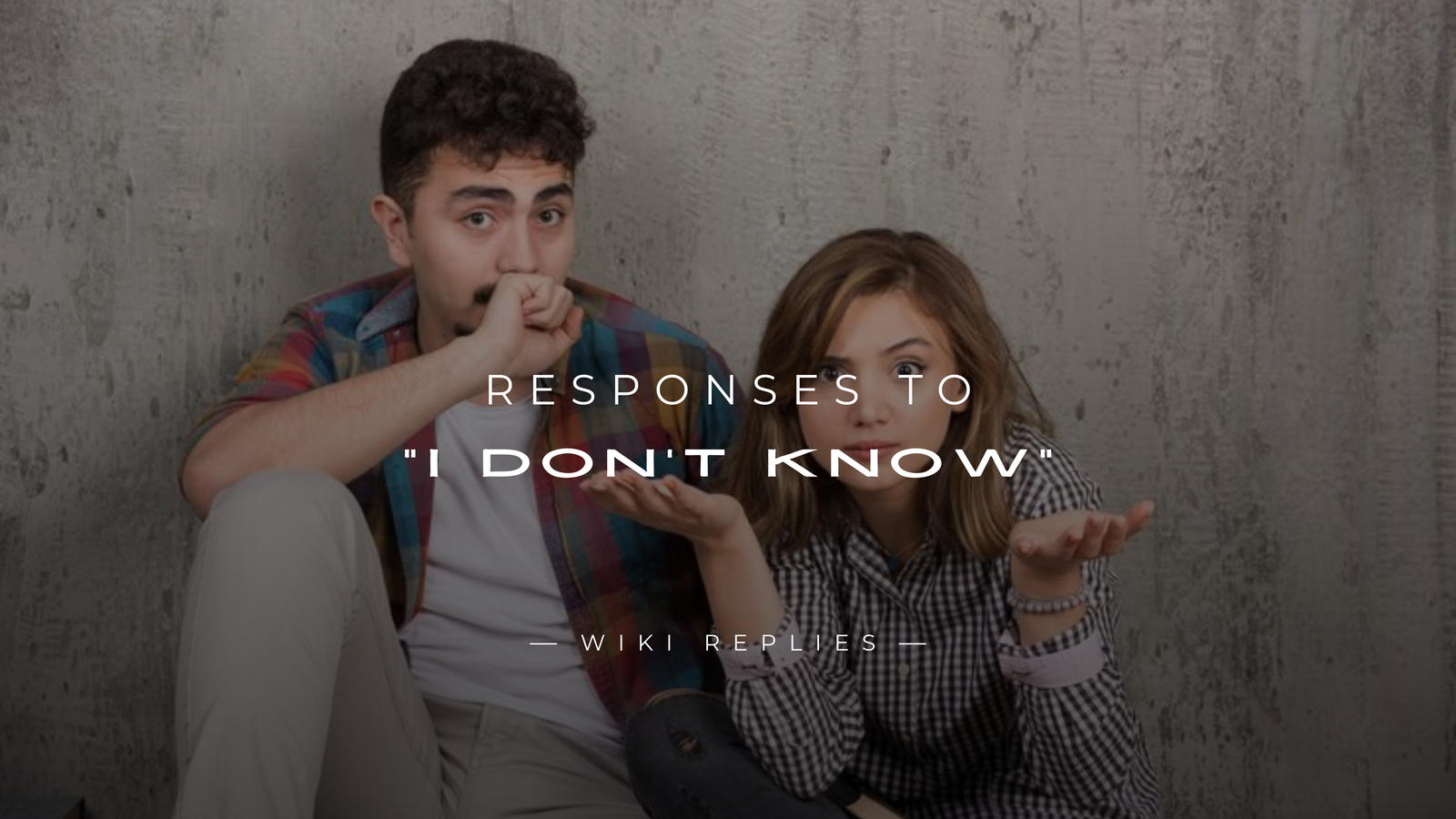We’ve all been there: you ask someone a question, and the reply you get is simply, “I don’t know.” Whether it’s at work, in a conversation with a friend, or even with family, hearing these three little words can sometimes leave you feeling frustrated, confused, or even helpless. But before you react, let’s take a moment to dig deeper into what “I don’t know” really means and how we can respond in ways that promote understanding, connection, and problem-solving.
In this article, we’ll explore various ways to respond to “I don’t know,” the psychology behind it, and how a thoughtful answer can open doors to more meaningful conversations and solutions.

220+ Responses to “I Don’t Know”
Clarifying Responses
- What exactly feels unclear to you?
- Is it the topic in general or something specific?
- Can you walk me through your thought process?
- Do you mean you’re unsure, or totally unfamiliar?
- Where do you feel stuck?
- What part of it do you think you might know a little about?
- Are you not sure what it means, or how to approach it?
- Do you want to try explaining what you do know?
- What do you think is missing?
- Have you encountered this before, even in a different form?
Guiding Responses
- Let’s break it down together and see where it takes us.
- Want to take a first guess and build from there?
- Maybe start with what seems most familiar?
- We can walk through it one step at a time.
- Let’s try narrowing it down—sometimes that helps.
- I’ll help steer things if you’re up for exploring it.
- How about we look at some examples?
- Is there a way we can simplify the question?
- Would it help if I rephrased it a bit?
- Think of it like a puzzle—what piece do you think comes first?
Encouraging Responses
- That’s totally okay—nobody has all the answers.
- Just the fact that you’re curious is a great start.
- We can figure this out together, no pressure.
- It’s brave to admit that, honestly.
- You’re doing fine—asking is part of learning.
- Don’t worry, I didn’t know this at first either.
- It’s totally fine to not know—this is how we grow.
- You’re not alone in this; we all get stuck sometimes.
- You’re on the right track by admitting you don’t know!
- This is the fun part—figuring it out together!
Reframing Responses
- Not knowing can be the first step to learning something new.
- What if we saw this as an opportunity to explore?
- Sometimes not having an answer opens up more possibilities.
- It’s actually good that you’re questioning things—keeps us sharp.
- Instead of “I don’t know,” maybe think of it as “I’m learning.”
- This is where the fun of discovery begins.
- What if not knowing is exactly what makes this interesting?
- Could be that you’re closer to the answer than you think.
- Not knowing now doesn’t mean you won’t know later.
- This is a chance to dig deeper and find something new!
Probing Responses
- If you had to guess, what would you say?
- What’s your best guess, even if it’s just an idea?
- Can you think of a similar situation where you did know?
- What’s one thing that might help you move forward?
- What would you need to know to make a guess?
- What does your instinct tell you?
- If you were in a position to guess, where would you start?
- Is there any part of it that feels a little clearer?
- What’s one thing you’re sure of, even if it’s small?
- What other options might we be overlooking?
Reflective Responses
- Why do you think you’re unsure about this?
- Have you encountered something like this before?
- What do you feel is missing in your understanding?
- Do you think it’s the complexity of the topic or a lack of information?
- How do you usually figure out things when you’re stuck?
- What’s holding you back from finding an answer?
- Do you remember a time when you didn’t know something and later figured it out?
- What’s your first instinct about this?
- How does this connect with something you already know?
- What would be the first step to getting more clarity?
Light or Humorous Responses
- Looks like we’re both in the dark here—let’s find a flashlight!
- I’m with you on this one—let’s see if we can puzzle it out!
- This is like a mystery novel—let’s solve it together!
- It’s okay, we can just make up something funny for now.
- If I knew, I’d be telling you—I swear!
- Guess we both need to Google this one.
- Well, we can’t be experts on everything, right?
- We should start a support group for “I don’t know” moments.
- That’s one way to keep things interesting—let’s figure it out!
- I think we’ve just discovered the meaning of life… just kidding, we’ll keep looking!
Informational Responses
- Here’s what I’ve found about that.
- Actually, the answer might be in this resource.
- The general concept is like this…
- If you look at it from this angle, it might help clarify.
- I’ve read that it works like this…
- Let me give you some background to help you understand.
- You might want to check this out—it might shed some light on it.
- This is a topic I’ve seen explained in a few different ways…
- I know this can be tricky, but here’s the breakdown.
- This could help you get started in understanding it better.
Neutral or Non-Pressuring Responses
- No worries, we can come back to this later.
- It’s okay to not know right now, we’ll figure it out when we’re ready.
- Don’t stress, take your time thinking about it.
- There’s no rush—we can take it at your pace.
- Whenever you feel ready, we can dive into this together.
- It’s fine if you’re unsure right now, there’s plenty of time.
- Take your time, we can revisit this when you feel up to it.
- We don’t have to figure it all out at once.
- I’m happy to wait until you have more clarity.
- Feel free to let me know whenever you’re ready to explore this more.
Supportive Responses
- I’ve got your back, we can work through it together.
- It’s totally okay—let’s go over it step by step.
- I’m here for you—let me know how I can help.
- Don’t worry, we’ll figure this out. You’re not alone in this.
- You’re doing great, even if it doesn’t feel like it right now.
- I know it’s tough, but we’ll get there together.
- I’m confident that we’ll understand it better as we go along.
- It’s okay to be uncertain—learning is a journey, not a race.
- You’re on the right track, just keep going!
- It’s perfectly normal not to know, and I’m here to help.
Validating Responses
- It makes sense that you’re unsure; this can be confusing.
- It’s totally okay not to know—everyone feels that way sometimes.
- I understand why you’re not sure about it; it’s tricky.
- That’s a reasonable response—you’re not alone in feeling this way.
- I get why this might feel overwhelming; we’ll figure it out.
- You’re not the only one who doesn’t know this—it’s tough.
- It’s totally understandable that you don’t have the answer right now.
- It’s okay to be unsure; it just shows that you’re thinking critically.
- That’s a valid response—no one expects you to know everything.
- I get it, it’s hard to have all the answers right away.
Redirecting Responses
- Let’s focus on what we do know, and build from there.
- Let’s try a different approach and see if that helps clear things up.
- How about we take a different route to tackle this?
- Maybe we can look at it from another angle.
- Let’s try starting with a simpler question to get us going.
- If we change the direction a little, we might be able to make progress.
- We can always circle back to this later; let’s try a new way forward.
- Instead of worrying about this specific part, let’s look at the bigger picture.
- How about we look at something related that might help?
- Let’s try focusing on the easy parts first and come back to this later.
Socratic Responses
- What do you think could be a possible solution to this?
- How might you approach this if you were to guess?
- What would happen if we tried to break it down into smaller steps?
- What would you need to understand this better?
- Is there a pattern or principle we could apply to this?
- How do you think we could figure this out?
- What do you already know that might help us here?
- If you had to explain it to someone else, what would you say?
- What makes you unsure about this? Can you identify where the confusion is?
- If we look at this from a different perspective, how does that change things?
Empowering Responses
- You’ve got this—I believe you can figure it out.
- Don’t forget, you’ve solved tricky problems before!
- You’re more capable than you realize, and we’ll get through this.
- Trust yourself—you know more than you think.
- This challenge is an opportunity to learn and grow—you’re up for it!
- You have the ability to tackle this, just take it one step at a time.
- This might seem tough, but I know you can handle it.
- You’ve got the skills; now it’s just about figuring out the next move.
- I believe in your ability to work through this, piece by piece.
- You’re already on the right track—just keep going!
Motivational Responses
- Every challenge is just an opportunity in disguise.
- Remember, it’s the struggle that makes the success worth it!
- Keep going, you’re getting closer even if it doesn’t feel like it.
- You’ve overcome things like this before—you can do it again!
- It might take a little time, but persistence pays off.
- This is your moment to shine—you’ve got everything it takes!
- The road might seem tough now, but each step forward counts.
- Don’t get discouraged, progress is being made every day.
- You’re stronger than you think, and you’ll get through this!
- Remember, success isn’t about knowing everything—it’s about staying determined.
Collaborative Responses
- Let’s figure this out together; I’m sure we can crack it.
- How about we brainstorm and see what ideas we come up with?
- We’re in this together, so let’s put our heads together.
- What do you think would happen if we worked through this as a team?
- I don’t know either, but let’s work through it and learn together.
- Let’s take a closer look and see if we can make sense of it.
- How do you feel about tackling this as a group effort?
- I’m all in if you want to work through it together!
- What if we approach this like a puzzle and help each other with the pieces?
- Let’s give this a shot together—we might surprise ourselves!
Speculative Responses
- Maybe there’s a connection we haven’t seen yet?
- What if it’s related to something else entirely?
- It could be that the answer is hiding in plain sight.
- I wonder if this will become clearer once we look at it from a different perspective.
- What if we’re overthinking it and the answer is simpler than we think?
- It’s possible that we haven’t explored all the options yet.
- Maybe we’re missing a crucial piece of the puzzle.
- Could it be that there’s an unexpected factor we haven’t considered?
- What if the answer is just outside the scope of what we’ve thought about?
- Perhaps we need more information before we can come to a conclusion.
Time-Giving Responses
- Take your time, we don’t need to figure it all out right now.
- Don’t worry, we can come back to this after thinking about it for a while.
- I’m happy to give this more time—let’s revisit it when we’re ready.
- Let’s step away for a bit and see if we come up with something fresh later.
- There’s no need to rush; we’ll figure this out when the time feels right.
- Take a moment to reflect, and we’ll tackle it again later.
- We don’t need to solve this immediately—let’s think it over.
- How about we give ourselves a little more time to process it?
- Sometimes it helps to pause and return with a clearer mind.
- Let’s revisit this in a bit; maybe we’ll come back with a new perspective.
Challenging Responses
- What do you think is stopping you from figuring this out?
- How do you feel about taking a risk and making a guess?
- Do you think we’re avoiding the answer for some reason?
- Why not try tackling it head-on instead of avoiding it?
- What if you pushed yourself to take a shot at answering, even if you’re unsure?
- Can you think of any reason why we might be making this harder than it is?
- If you did know, how would you go about solving this?
- Are you sure you don’t know more than you think?
- What would happen if we tried to approach this challenge with more confidence?
- How could we challenge ourselves to think outside the box here?
Curiosity-Based Responses
- What do you think we would discover if we dug a little deeper?
- I wonder what would happen if we tried looking at this from a different angle.
- I’m curious—what would happen if we approached this from a totally different direction?
- How do you think this might connect with something else we already know?
- I’m intrigued—what would it look like if we approached this problem step by step?
- What if we started asking different questions to find new insights?
- I wonder what would happen if we turned this idea on its head.
- What do you think is the key that’s missing here?
- Have you thought about how this might tie into something unexpected?
- I’m curious if there’s a clue we’re overlooking—what do you think?
Empathic Responses
- I can totally understand why that’s confusing—it’s a tricky one.
- I feel your frustration—sometimes things just don’t click right away.
- It’s okay to be unsure; we all get stuck sometimes.
- I know that feeling of not having the answer—don’t worry, we’ll get through this.
- I hear you—it’s hard when you don’t have the answer right off the bat.
- I understand—it’s tough when things don’t make sense at first.
- I get why that’s a challenge; it can be overwhelming.
- I know you’re doing your best—it’s okay to not have all the answers yet.
- It’s completely understandable to be unsure right now; we’ve all been there.
- I get it, and I’m here to help however I can.
Process-Oriented Responses
- Let’s focus on how we can break this down into smaller parts.
- The first step is to gather what we already know—then we’ll build from there.
- If we focus on the process, we can make sense of the details along the way.
- Instead of worrying about the end result, let’s think about the next step.
- If we keep following the process, things should start to come together.
- Let’s take this one step at a time and see how things unfold.
- Focusing on the steps will make this less overwhelming—let’s start with the basics.
- We can go through the process methodically and see where we land.
- The key here is to keep the process in motion—step by step, it will make sense.
- Let’s work through the stages of this and stay focused on what’s next.
Understanding the Meaning Behind “I Don’t Know”
The phrase “I don’t know” might seem simple, but it can carry a lot of different meanings depending on the context. Let’s break down the various reasons someone might say this, so you can better understand how to respond appropriately.
- It Might Be a Defense Mechanism
Sometimes, people use “I don’t know” as a way to shield themselves from judgment or fear. If they don’t have an answer right away, they might say this to avoid feeling embarrassed or making a mistake. This is especially common in high-stakes environments like the workplace, where people feel pressure to have all the answers. Instead of offering a quick solution, they might retreat to “I don’t know” to avoid being wrong.
- It Could Reflect Uncertainty or Fear
When someone says, “I don’t know,” they may simply be uncertain or fearful. They might be struggling with the idea that admitting they don’t know something could make them look less competent or capable. This often happens in situations where they feel vulnerable or pressured to know everything, such as during a job interview or when discussing a sensitive issue with a friend.
- Sometimes It’s Just Honest
Of course, sometimes “I don’t know” is exactly what it sounds like—a straightforward admission that the person genuinely does not have the information. It could be that they need more time, more data, or more clarity to give a thoughtful answer. This is completely natural and shouldn’t always be viewed negatively.
Situational Context Matters
When you hear “I don’t know,” the context matters immensely. How you respond can change depending on the situation. Whether it’s a casual conversation with a friend or a professional discussion, the way you address this uncertainty can either foster growth or shut down communication. Let’s explore a few situations where “I don’t know” might pop up and how you can approach each one.
- At Work
In the workplace, hearing “I don’t know” might be a bit unsettling, especially if you’re managing a team or working on a crucial project. However, instead of reacting with frustration, use it as an opportunity to foster teamwork. Try to encourage a collaborative environment where people feel comfortable saying “I don’t know” without fear of judgment. You can help them figure out the answer together or direct them to the resources that will help.
- In Personal Relationships
When a close friend or family member says “I don’t know,” it can signal emotional uncertainty. For example, your partner might say “I don’t know” when you ask about future plans, or a friend might say it when they’re unsure of how to proceed with a personal issue. In these cases, responding with empathy and patience is key. Let them know you’re there to support them, and don’t pressure them into finding an answer immediately.
- With Children or Students
Children and students often say “I don’t know” when they feel unsure about a question. Whether they’re avoiding a difficult task or simply need time to process information, it’s important to create a safe space for them to express uncertainty. A good response in this situation involves asking guiding questions to help them think through the issue and encouraging them to try again.
Emotional Intelligence in Your Response
Your emotional intelligence plays a huge role in how you respond to “I don’t know.” The way you react can either make the person feel heard and supported, or it can make them retreat further into their uncertainty. Here are some tips for reacting thoughtfully:
- Staying Calm and Open-Minded
When someone says “I don’t know,” it’s easy to feel frustrated, especially if you were expecting an answer. But keeping calm and open-minded allows you to create an atmosphere of trust. Respond with patience, and show the person that it’s okay not to know everything all the time. This encourages an open and honest dialogue.
- Avoiding Judgment or Pressure
Avoid making the person feel judged for not knowing the answer. Judgment can shut down communication and make people defensive. Instead, show empathy by saying things like, “I understand that this might be a tough question” or “That’s okay, we can figure it out together.”
- Reading Between the Lines
Sometimes “I don’t know” is just a surface response to something deeper. Pay attention to the person’s tone, body language, and facial expressions. If they seem uncomfortable, anxious, or overwhelmed, they might need more support or encouragement. Being attuned to these emotional cues allows you to respond more thoughtfully.
Effective Strategies to Respond
So, how should you respond when you hear “I don’t know”? There are a few effective strategies that can help you encourage further discussion and problem-solving.
- Ask Open-Ended Questions
Instead of shutting the conversation down, keep it going with open-ended questions. For example, instead of asking, “Why don’t you know?” ask, “What do you think could be the answer?” or “What would help you feel more confident about this?” Open-ended questions encourage reflection and critical thinking, leading to a more fruitful conversation.
- Encourage Critical Thinking
If you sense that someone is unsure but capable, encourage them to think critically about the problem at hand. Ask guiding questions like, “What’s your best guess?” or “What would be the first step to finding the answer?” This can help them engage their brain and come up with possible solutions, even if they’re unsure at first.
- Give Them Time and Space
Sometimes, the best response is simply giving the person time. If someone says “I don’t know,” don’t rush to fill in the blanks for them. Give them a moment to process and think. You might say, “Take your time, we don’t need to have all the answers right now.”
- Offer Guidance Without Taking Over
Offering support without taking control is key. If someone says, “I don’t know,” you can help them brainstorm or guide them toward possible solutions, but avoid taking over. Encourage them to contribute their thoughts and ideas, which can lead to a more collaborative outcome.
Reframing “I Don’t Know” as a Starting Point
Rather than seeing “I don’t know” as an obstacle, try to reframe it as an opportunity to explore together.
- Turning Uncertainty Into Curiosity
When someone says they don’t know, it’s a chance to dig deeper into the topic. You could say, “That’s okay—let’s explore it together,” or “What could we look up to find the answer?” Instead of rushing to find an answer, approach it with curiosity. This can lead to a more engaging and enriching conversation.
- The Power of Collaborative Exploration
In many cases, “I don’t know” is the perfect starting point for collaboration. Use it as an invitation to work together to find the solution. Whether it’s brainstorming ideas or conducting research, this approach strengthens teamwork and builds a deeper sense of partnership.
What NOT to Do
While it’s important to know what to do, it’s just as crucial to understand what not to do when someone says “I don’t know.” Here are some common mistakes to avoid:
- Don’t Mock or Dismiss the Answer
If you mock someone for saying “I don’t know” or dismiss it as unimportant, you risk alienating them. It’s important to approach the situation with respect and empathy. A harsh response can make someone feel invalidated, and they might avoid sharing their uncertainty with you in the future.
- Avoid Firing Back With More Pressure
Instead of pushing for an immediate answer, try to foster a comfortable space for discussion. Pushing someone too hard for an answer can create anxiety and inhibit their ability to think clearly. Be patient, and allow them to process the information at their own pace.
- Refrain From Taking It Personally
Someone’s uncertainty isn’t a reflection of your intelligence or authority—it’s simply a part of the human experience. Don’t take it personally if someone says “I don’t know.” Focus on helping them find the answer, not on any perceived shortcomings.
Examples of Good Responses
Sometimes, a well-thought-out response can make all the difference. Here are a few examples of how to respond in various settings:
Responses for Friends or Family
“That’s okay. We don’t have to have all the answers right now.”
“No worries! Take your time—let’s talk about it when you’re ready.”
“I understand. What are some of your thoughts so far?”
Responses for Professional Settings
“Let’s take a closer look at this together.”
“I’ll help you figure it out.”
“Let’s do some research and circle back with an answer.”
Responses for Teachers or Mentors
“That’s a great question. Let’s work through it together.”
“It’s okay not to know. What are some ways we can find out?”
“Take a moment to think it through, and we’ll tackle it as a team.”
Training Yourself to Respond Better
Being effective in your responses takes practice. Here are a few ways you can train yourself to handle “I don’t know” with more grace:
- Practice Active Listening
When someone says “I don’t know,” don’t jump to conclusions or solutions right away. Focus on listening to what they’re actually saying. This helps build rapport and allows you to craft a more thoughtful response.
- Role-Playing Scenarios
To improve your response time, consider practicing role-playing scenarios with friends, family, or colleagues. By doing this, you’ll become more comfortable navigating conversations when someone says “I don’t know.”
- Journaling for Reflection
After each conversation where “I don’t know” comes up, reflect on how you handled it. Journaling can help you process your emotions and figure out how to respond more effectively in the future.
Benefits of Responding Thoughtfully
Taking the time to respond to “I don’t know” thoughtfully has a ton of benefits, including:
- Builds Trust and Connection
When you respond with empathy and patience, you create an environment where people feel safe to admit when they don’t have the answers. This helps build trust and strengthens relationships.
- Encourages Honest Dialogue
Responding to uncertainty in a thoughtful way encourages honesty. People will feel more comfortable admitting when they don’t know something, which leads to better communication.
- Leads to Better Problem Solving
By keeping the conversation open and collaborative, you’re more likely to come up with creative solutions. Brainstorming together leads to better problem-solving overall.
Conclusion
Mastering how to respond to “I don’t know” can turn uncertainty into confidence and help you navigate conversations with grace, professionalism, or even a touch of humor. Whether you’re in a job interview, casual chat, or unexpected situation, having the right words ready makes all the difference. Remember, it’s not always about having the answer—it’s about how you handle not having one. And if you enjoyed this guide, you might also like our 220+ Best Responses to “WSP” (What’s Up?) Here’s How to keep your replies sharp and engaging in any casual convo too.
FAQs
Q. What if someone always says “I don’t know”?
If this happens repeatedly, it might indicate a lack of confidence or fear of being wrong. Try to gently encourage them to explore solutions with you and build a safe space for them to share.
Q. How do I respond when I don’t know either?
It’s okay to admit that you don’t know. Respond with honesty, like, “I don’t know either, but let’s figure it out together.”
Q. Can “I don’t know” be a way to avoid conflict?
Yes, it can be a way to avoid tough discussions. If you sense this, approach the conversation with empathy, and try to dig deeper into the person’s concerns.
Q. Should I push for an answer or let it go?
If the situation isn’t urgent, it’s better to let it go and revisit the conversation later. If it’s urgent, ask follow-up questions to help guide the person toward an answer.
Q. How do I handle it in a leadership role?
As a leader, it’s important to create a culture where uncertainty is okay. Offer support without taking over, and encourage your team to work together to find answers.










